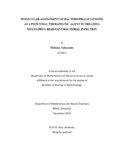Molecular assessment of bacteriophage genome as a potential therapeutic agent in treating multi-drug resistant bacterial infection

View/Open
Date
2019-12Publisher
Brac UniversityAuthor
Tabassum, MehnazMetadata
Show full item recordAbstract
Bacteriophage therapy sheds a fresh light upon the critical growth of antibiotic resistance. Antimicrobial resistance, one of the major public health concerns, requires a novel therapeutic strategy to be optimized. Phage therapy is being renovated in this regard. Few of the main challenges include shifting the dynamics of the micro biome, selecting the most adequate phages, integrating the clinical phages as prophage, probable immune responses and regulatory requirements. The major drawback lies within the phage genome. Though phages carry a plethora of genes that confer fitness advantages to the bacterial community, these genes are highly variable from phage to phage. The presence of fitness factors with the possibility of recombination or horizontal gene transfer complicates the application of phages. Here, we assess the potential of phage therapy from a clinical perspective. The analysis will include the possibility of using phages with no biosafety concern. Considering the isolation techniques, the number of phages per bacterial host vary a lot, which will also be considered for individual bacterial species level. Such evaluation will help us to primarily evaluate the potential of using existing phages as an alternative of treating infectious diseases with multiple drug resistant bacteria.
